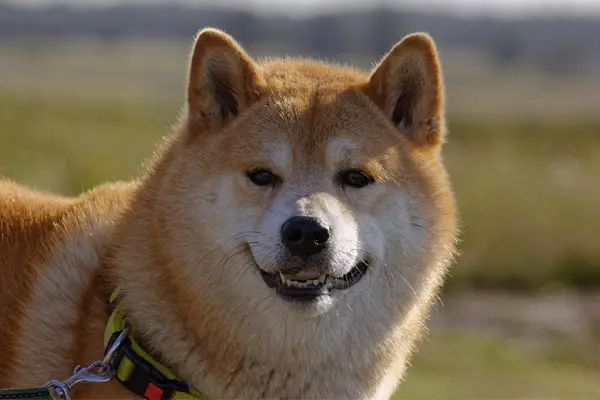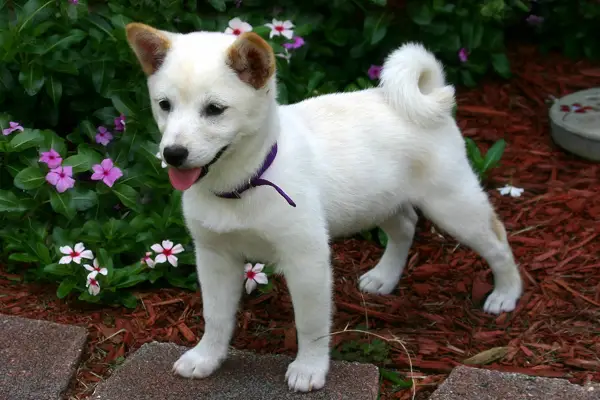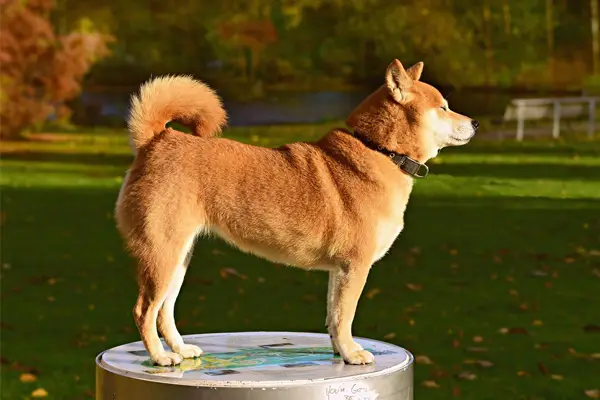The Shiba Inu is a dog breed that originated in Japan. It was already a popular dog breed even before they reached the Western lands. They feature white marking combined with color that can be red, red sesame, or black and tan. They also have a very alert expression and a movement that could resemble that of a fox.
This dog breed is highly active and playful. He also loves a lot of pampering, where he is used to getting what he wants. This is not a dog breed for first-time dog owners, as handling him is quite a challenge. He needs someone firm, confident, and consistent. And of course, someone who doesn’t spend a lot of time away.

Shiba Inu Statistics
| Dog Breed Group | Non-Sporting |
| Breed Size | Small |
| Height | 14.5-16.5 inches (male); 13.5-15.5 inches (female) |
| Weight | 23 pounds (male); 17 pounds (female) |
| Lifespan | 13-16 years |
Shiba Inu Ratings
| Energy level | |
| Exercise needs | |
| Requires attention | |
| Playfulness | |
| Trainability | |
| Shedding | |
| Grooming | |
| Friendly with family | |
| Friendly with kids | |
| Friendly with strangers | |
| Friendly with other dogs | |
| Prey Drive |
Shiba Inu History
The Shiba Inu’s history can be traced back to 1920, Japan. It is one of the oldest Japanese dog breeds that is a result of centuries of breeding, preservation, and protection. It is also one of the most recognized dog breeds around the world that came from Japan.
There are three theories as to how the name Shiba Inu came to be.
The first is that the term Shiba translates to brushwood since it’s the dog’s usual hunting grounds.
The second is that the term Shiba refers to the color of the brushwood leaves, which is similar to the Shiba Inu’s coat color.
And the third one is that the Shiba translates to the word small.
But, whichever theory is correct, all is an excellent fit for our modern Shiba Inu.
Based on historical evidence, Shiba Inus go back to 300 BC, where Samurais use them for hunting deer, wild boar, and small game. But as years passed, the Shibas left their hunting games and became loving companion animals.
Sadly, the dog breed was almost wiped out during World War II with all the bombings in Japan. And even after that, the dogs suffered from a distemper outbreak. Their numbers were significantly reduced, and a lot of efforts put just to reserve the dog breed.
By 1954, the first Shiba Inu was introduced to the U.S., and the American Kennel Club officially recognized them in 1992.
Since then, Shibas have been rising to popularity all over the world. They currently rank 44th as the most popular dog breed in the U.S.

Shiba Inu Temperament
Shiba Inus are known to be alert, active, and attentive dogs. They may look reserved, calm, and quiet. However, they can be quite a challenge to handle.
They are bold and high-spirited dogs that must always be kept on leash. Since they are used to being hunting dogs, they have instincts to catch smaller prey. They are also known for their speed and agility, which can outrun humans.
Shiba Inus are best with owners that have secured fences. This means it should be high enough, and there should be no openings where he can go through.
When it comes to family, Shiba Inus are very affectionate dogs. They can also be very attached and cannot stand being separated. This is why they’re best companions for those who don’t need to go out much.
They are not vocal dogs. However, they will bark at strangers and other pets strange to them. So make sure to always check whenever your Shiba will alert you on something.
One particular personality of a Shiba Inu is that they’re very cat-like. These are very clean dogs and very easy to potty train.
Early socialization is essential to control your Shiba Inus negative temperaments. Introduce him to strangers, other animals, and new sights and sounds, so he remains calm.
With confident, firm, and consistent training, they are excellent family pets. This might also help control his demanding trait where he wants almost everything.
Shiba Inu Care Requirements
- Nutrition: High-quality and a well-balanced diet are essential to keep the Shiba Inu healthy. You should also watch out for the amount you feed him daily so he won’t get overweight. A well-balanced diet should contain protein, carbohydrates, fats, vitamins, and minerals, all of which are essential nutrients needed by a dog. Proteins will help support muscle growth and repair of any tissue, while carbohydrates and fats are crucial in providing him energy. The daily calorie intake should depend on his age and daily activity. Usually, the formula used is “30 x (weight in kgs) + 70”. But, to be sure, you also need to go to your vet for some guidance. For the food that they can eat, make sure that you only buy high-quality ingredients. That means you should get their protein from animal meat such as chicken, beef, lamb, or fish. You can also add fruits and vegetables for fiber. Stay away from commercial dry foods that contain meat by-products, fillers, and any other chemicals that will not be good for the dog’s digestive system.
- Grooming: Shina Inus shed a lot, at least twice in a year. They have short coats that don’t require a lot of brushing as mats and tangles don’t quickly form. However, they may require at least a weekly brushing to remove any loose hair that can stick to your floor, couch, and other furniture. Do this daily if the shedding season comes. They don’t also need a lot of baths since they are naturally clean dogs. However, ears should be checked and cleaned regularly to avoid ear infection. Nails should be checked and trimmed as well when needed. Long nails are not great for dogs, as this can be painful for them.
- Exercise: Shiba Inus are not energetic. Even if they don’t exercise, they’ll be okay with it and won’t complain. However, exercising is a great way to keep them healthy. Most of the time, daily walks would suffice. You can dedicate at least one hour of walking daily. You can also create some indoor activities that you can do with your Shiba Inu if you don’t want to go out too.
- Health: Shiba Inu is a very healthy breed. This is because they were not exposed to a lot of crossbreeding, unlike any other dog breeds. However, there are still diseases you would have to watch out for. Some of the most common health issues in Shiba Inus are eye conditions such as glaucoma, progressive retinal atrophy, and cataracts. They are also prone to patellar luxation, where a ligament in the knee is weak. You also need to watch out for hypothyroidism, seizures, allergies, hip dysplasia, and cancer. In some of these conditions, screening tests are available to detect them at an early stage. For genetic health issues, you can always check the history of the breed’s parents so you can be aware of any possible health problems.
- Lifespan: The life expectancy of Shiba Inu is 13-16 years.

Famous Shiba Inus
- Mari: A Shiba Inu who saved her family from an earthquake in 2004
- Pusuke: One of the world’s oldest living dogs in the Guinness Book of World Records; died at age 26 in 2011
- Ryuji: An Instagram famous Shiba Inu is known for his ‘macho’ expressions
Fun Facts About Shiba Inus
- The Shiba Inu is an ancient breed that goes way back in 7000 B.C.
- They originated in Japan.
- They were originally used as hunting dogs.
- They used to come in three types before World War II – the Mino, the Sanin, and the Shinshu.
- They almost became extinct during and after World War II. That’s why most modern Shiba Inus resembles the Shinshu variety.
- They have cat-like personalities.
- They are escape artists.
Check Out Other Non-Sporting Dog Breeds:
American Eskimo Dog, Bichons Frises, Boston Terrier, Bulldog, Chinese Shar-Pei, Chow Chow, Coton de Tulear, Dalmatian, Finnish Spitz, Keeshonden, Lhasa Apsos, Lowchen, Norwegian Lundehund, Schipperkes, Tibetan Spaniel, Tibetan Terrier, Xoloitzcuintli
